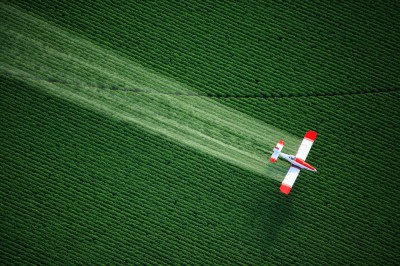For the first time, scientific researchers have tied the most popular and commonly used insecticides – neonicotinoids — to the reduction in farmland birds.
The findings represent an increase in the dangers of chemical agricultural products, such as those made by Bayer. The report also warns that the pollution created by the nerve agents is now threatening all food production.
Neonicotinoids were first developed by Bayer, and the company sells seeds coated with the chemical.
The peer-reviewed research was published in the journal Nature, a renowned leader in environmental studies, and noted that tree sparrows, starlings and swallows are among the bird species most impacted by neonicotinoids. Their populations fell in farmlands where neonicotinoids were used most, The Guardian said.
According to the report, at least 95 percent of neonicotinoids applied to crops find their way into the environment at large. The chemical reportedly kills honeybees — the pollinators the human race heavily relies upon – as well as other insects and birds at an alarming rate. Honeybees provide pollination for 70 percent of the food we grow to eat. Bees don’t pollinate corn, but the pollen drifts elsewhere, where it makes contact with bees.
New Survival Seed Bank™ Lets You Plant A Full Acre Crisis Garden!
Unlike the European Union and a host of other nations which have banned or limited the use of neonicotinoids, the United States is waving them on for continued use.
“I think we are the first to show that this insecticide may have wide-scale, significant effects on our environment,” Hans de Kroon of Radboud University and an author of the report, told National Geographic.
De Kroon and his team reviewed the habits and possible causes of bird declines from 2003 to 2010 and determined that neonicotinoids were to blame – either by killing the birds’ food source (insects) or by harming the birds when they eat the seeds. He called the findings “very surprising and very disturbing.” Researchers found “an incredible amount of imidacloprid in the water” surrounding the farmland. Bayer produces imidacloprid, a neonicotinoid.
“And it is not likely these effects will be restricted to birds,” he said. “All the other studies [on harm caused by neonicotinoids] build up from toxicology studies. But we approached this completely from the other end. We started with the bird population data and tried to explain the declines. Our study really makes the evidence complete that something is going on here. We can’t go on like this anymore. It has to stop.”
University of Sussex professor David Goulson was not involved with the environmental study, but found the report convincing upon review.
“The simplest, most obvious explanation is that highly toxic substances that kill insects lead to declines in things that eat insects,” Goulson said.
A Bayer representative said there was no link.
“It provides no substantial evidence of the alleged indirect effects of imidacloprid on insectivorous birds,” the representative said. “Bayer CropScience is working with the Dutch authorities and agricultural stakeholders to ensure the safe use of imidacloprid-containing crop protection products and to preserve the environment.”
The Bayer spokesmen also claimed that neonicotinoids have gone through “extensive risk assessments” which proves the chemical is safe for the environment when used according to label instructions and properly.
Related research published in the journal Functional Ecology concluded that neonicotinoids damage the natural ability of bees to collect food.
What do you think should be done to protect the birds, bees, the environment, and ultimately the food supply, from neonicotinoids? Tell us in the section below:
 Off The Grid News Better Ideas For Off The Grid Living
Off The Grid News Better Ideas For Off The Grid Living





